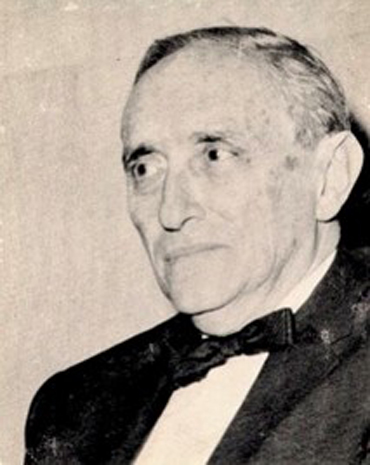Schechtman, Joseph B.
Schechtman, Joseph B. or Shekhtman, Yosyp [Шехтман, Йосип], b 6 September 1891 in Odesa, d 1 March 1970 in New York, New York State, USA. Prominent Zionist leader; co-founder, with Vladimir Jabotinsky, of Revisionist Zionism that advocated an expansionist program for Israel; writer; and researcher of population transfers in Europe. Schechtman was educated at New Russia University in Odesa. While studying there, he established contacts with members of the Ukrainian national movement and in 1910 published an article in the Saint Petersburg magazine Evreiskii mir (Jewish World), in which he advocated Ukrainian-Jewish dialogue. Among Ukrainians, this article was met with a favorable response and a very positive review of it was published in the Kyiv newspaper Nova rada (Kyiv). Schechtman continued his studies in Berlin and graduated with a doctorate of law in 1914. While in Germany, and he was also a Berlin correspondent of the Jewish weekly Rassvet (Dawn).
From early youth Schechtman was active in the Zionist movement. He was elected to the All-Russian Jewish Congress in Petrograd in 1917, and the Jewish National Council in Kyiv in 1918. Active in Ukrainian Jewish politics, he became a member of the Central Rada, where he consistently advocated Jewish self-defence against anti-Jewish pogroms. During the Hetman government of Pavlo Skoropadsky and during the Directory of the Ukrainian National Republic Schechtman collaborated with Elias Tcherikower and other prominent Jews on producing Di idishe avtonomie un der natzionaler sekretariat in Ukraine: Materialn un dokumentn, one of the most authoritative accounts of the Jewish experience during the Ukrainian Revolution of 1917–20. An abridged account of his experiences was later published in English. He also wrote a book on the pogroms perpetrated against the Jews by the ‘White’ Volunteer Army of General Anton Denikin (Pogromy Dobrovol'cheskoi armii na Ukraine: k istorii antisemitizma na Ukraine v 1919–1920 gg.; Berlin, 1932).
Schechtman emigrated from Ukraine in 1921. He spent the next 20 years in France and other European countries before settling in the United States of America in 1941. Schechtman worked with the Committee of Jewish Delegations preparing materials for the Schwartzbard Trial. Later, he was president of the United Zionist Revisionists of America, chairman of the World Council of the Zionist Revision Movement, while also serving in the Office of Strategic Services in Washington, DC, as a specialist on population movements. His studies in this field include European Population Transfers 1939–1945, published by Oxford University Press in 1946; Postwar Population Transfers in Europe 1945–1955, and The Refugee in the World: Displacement and Integration. One of his best-known works is a two-volume biography of Vladimir Jabotinsky; volume 1, published in 1956, was entitled Rebel and Statesman; volume 2, Fighter and Prophet, was published three years later.
BIBLIOGRAPHY
Schneiderman, Harry and Itzhak J. Carmin (eds). Who’s Who in World Jewry: A Biographical Dictionary of Outstanding Jews (New York 1955)
Mazower, Mark. No Enchanted Palace: The End of Empire and the Ideological Origins of the United Nations (Princeton 2009)
Ferrera, Antonio. ‘Eugene Kulischer, Joseph Schechtman and the Historiography of European Forced Migrations,’ Journal of Contemporary History, vol. 46, no. 4 (2011)
Larysa Bilous
[This article was updated in 2022.]
